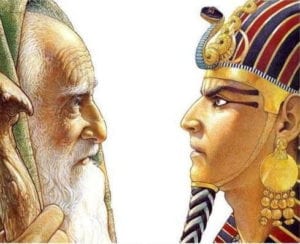
An Old Testament KnoWhy relating to the reading assignment for Gospel Doctrine Lesson 13: Bondage, Passover, and Exodus (Exodus 1-3; 5-6; 11-14) (JBOTL013A)
Question: What did the Lord mean when He said Moses would become “god to Pharaoh”? And how did the symbolism of the plagues undermine the worship of the Egyptian gods?
Summary: Surprisingly, Exodus 7:1 does not say that Moses was to be “like a god” to Pharaoh. Rather, the Lord’s words to the prophet in Hebrew read literally: “I have made you God/god to Pharaoh.” To make sense of this statement, it must be remembered that Pharaoh was considered to be a god by his people, “the living embodiment of the god Horus, god of kingship, represented by the falcon.” Thus, to prepare Moses for his summit meeting with the leader of Egypt, the Lord made him not only Pharaoh’s “equal” in rank but in addition also enabled him to demonstrate the greater potency of the true and living God whom he served. Because Pharaoh was divine in the eyes of the Egyptians, “he should have been the one to function as a god to Moses.” However, in a display of power whose symbolism would have been understood both by the Egyptians and the people of Moses, Jehovah, the God of Israel, turned the tables against Ra, the supreme sun-god of Pharaoh. By means of the plagues, the great I AM executed His judgment “against all the gods of Egypt,” a phrase meant to include Pharaoh and his firstborn son. Drawing primarily on the work of Rutgers professor Gary A. Rendsburg, this article will describe the significance of the means by which Jehovah devastated Ra.
The full article may be found at the Interpreter Foundation website: KnoWhy OTL13A — What Did the Lord Mean When He Said Moses Would Become “God to Pharaoh” During the Plagues of Egypt?
For Gary Rendsburg’s 8 March 2007 BYU Kennedy Center talk entitled “Light from Egypt on the Exodus Story,” see https://www.youtube.com/watch?v=_iwvTZnwSy0 .
To access Gary Rendsburg’s 2013 video presentation of “Moses the Magician” at the UCSD Exodus Conference “Out of Egypt: Israel’s Exodus Between Text and Memory, History and Imagination,” see https://www.youtube.com/watch?v=aYhNo1jC9Fg .
